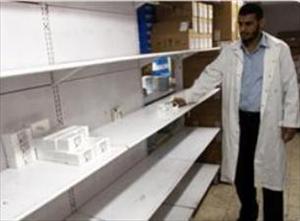The Islamic Republic of Iran has been very vocal recently regarding the impact of sanctions on medicine imports. The Iranian representative in the United Nations was quoted by Press TV: "Mr. Ban Ki-moon! Here is my question: On the basis of which law and which moral, religious and human criterion, are the evil powers and arrogant countries imposing embargoes on the supply of medications and primary healthcare requirements of a nation’s children, women and men while the United Nations, which is headed by you, remains silent?”
Even US news organizations have picked up on this story. The New York Times published an article by Thomas Erdbrink, "Iran Sanctions Take Unexpected Toll on Medical Imports" on 2 November: "Though the unilateral sanctions put in place by the United States and the European Union have exemptions for medicines and medical equipment, as well as foodstuffs, companies interested in selling such merchandise to Iran require a special license from the Treasury Department’s Office of Foreign Asset Control."
The article also pointed out that despite the Treasury Department's recent steps to ease bureaucratic barriers to authorized exports to Iran, most banks are not inclined to deal with Iran, making payment to suppliers very difficult.
Tehran Bureau ran a story on 8 November, "Sanctions' Ill Effects, Part 1: The Disappearance of Lifesaving Drugs", with similar conclusions.
As a health care professional I thought it would be interesting to dig a little deeper and see what, if any, steps were taken by the regime to alleviate this "medicine shortage" problem, or if it was simply aggravating the problem in the hope of using the resulting human suffering as a tool to fight the sanctions.
Looking at the Farsi-language headlines in Iran, it was not very hard to see the other side of this story. Perhaps someone should recommend to the NY times and Tehran Bureau to do the same.
Minister of Health Marziyeh Vahid Dastjerdi was quoted by ISNA, "We don't know what happened to the hard currency allocated to the purchase of medicine." Ms. Dastjerdi also said that, out of the annual $2.5 billion allocated for the purchase and import of medicine, the Iranian Central Bank has only provided $600 million thus far.
Mehr News claimed that the allocated "medicine purchase" dollars were reassigned for the purchase of luxury goods such as makeup and luxury cars. The media article almost appeared to shift the blame of underfunding of the "medicine purchase program" to the the middle- and upper-classes who purchase luxury products.
Ettelaat newspaper reported that the head of Parliament's Health Committee was critical of the Government's handling of funding of the health care sector. He also confirmed the same figure of $600 million as the only amount provided by the Central Bank for the purchase and import of medicine this year.
So could this "medicine shortage" crisis be a result of the 76% drop in the "medicine purchase" budget or is all due to the western sanctions, as the regime claims?
Let's assume for the sake of argument that the facts about the drastic health care budget cuts are not a factor, and that Iran truly wants to import medicine but cannot. The next question to ask is if there is a way for Iran to purchase medicine without having to jump through hoops?
Some of you may remember discussions here about the new payment system which Iran had agreed with India whereby Iran gets paid for its oil in rupees deposited into a bank account in India. These can then be used by Iran to purchase Indian products, including medicine.
The Wall Street Journal recently reported that Mr. Rafeegue Ahmed, the president of the Federation of Indian Export Organization, had indicated that sn account was opened with $500 million and that it was expected to eventually hold $4.5 billion of Iranian oil sales revenue. The WSJ also reported that businesses on both sides had signed deals valued at an estimated $3 billion for shipment of goods, such as "rice, wheat, soy meal. and pharmaceutical products".
Perhaps someone should remind the Iranian regime that India happens to be a major pharmaceuticals producer and that the Iranian oil money sitting in Indian banks in local currency is available for medical purchases. Easier said than done I'm sure, as Iran may not see the upside in solving the "medicine shortage" in the country when it can get so much anti-sanction publicity from it.
In the meantime. Iranian patients are sure to be left to fend for themselves with no light at the end of this tunnel, as the regime clings to its nuclear policies and the West remain committed to forcing Iran to change its behaviour through sanctions.
I should mention that the health care system in Iran has not been totally neglected by the Government: sixty hospitals were recently issued a warning about the dress code of their nurses.
It's nice to see the regime is still focused on the "below-the-waist" concerns of society, even at a time of national crisis.
